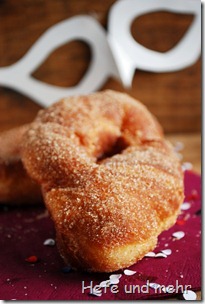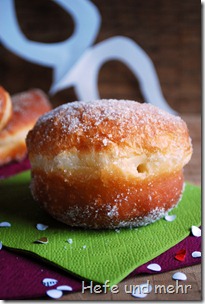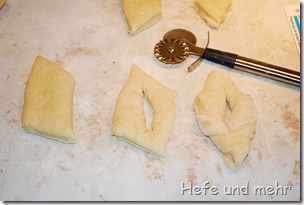 I’m always relieved when the time of carnival lays behind us, as I told before. Sarah of Life ain’t no ponyfarm draws comics that perfectly shows how I feel during the “Fifth season”.
I’m always relieved when the time of carnival lays behind us, as I told before. Sarah of Life ain’t no ponyfarm draws comics that perfectly shows how I feel during the “Fifth season”.
So only good thing in carnival for my opinion are the sweet pastry which is baked during the “jecken Tage”. And baking some kind of fried pastry is the only thing related to carnival I do each year. This year I did Berliner and something which my family calls “Geknotetes”.
This year I used a new recipe which I developed using Water Roux and Poolish for a extra soft crumb and for a aromatic taste. I made the Berliner small and proofed them shorter then last, which created a strong ovenspring which results in Berliner with the typical white “Collar” I am try to get for years. The other important thing is that the frying temperature should not be higher then 160°C.
For filling the Berliner I used the same construction as two years ago: a syringe which I combined with a 10 cm long cut of a drinking straw. That works like a charm and I don’t have to buy an extra filling tip.
I am a little bit proud of my Berliner this time, I never get this beautiful collars before and they tasted good, too.
Geknotetes und Berliner
yields 6 Berliner and 10 Geknotete s
s
Poolish
- 125g flour Type 550
- 125g Water
- 1g fresh yeast
Water Roux
- 150g Water
- 30g flour Type 550
Dough
- Poolish
- Water Roux
- 345g flour Type 550
- 120g Egg (2 Eggs Size L)
- 12g fresh yeast
- 5g Salt
- 50g sugar
- 75g Butter
Geknotete
- 100g sugar
- 1 Tsp. cinnamon
Berliner
- sugar for coating
- 100g marmalade
Mix all ingredients for the poolish and ferment overnight (12 to 16 hours) at roomtemperature.
For the water roux whisk water and flour until lump free, then heat it up to 65°C (needs about 3 min) while whisking. Fill the water roux in a bowl, cover its surface with cling foil and let it cool down to room temperature.
Knead all ingredients beside sugar and butter 5 min at slowest speed, then around 11 min on fast speed until complete gluten development. Now add sugar and butter and knead for about 2 min until butter and sugar are complete incooperated.
Divide the dough into 6 pieces of 60g and shape them into tight balls. Flatten the remaining dough to a thickness of 1 cm and cut into  Parallelograms with a side lengthof 10 cm x 5 cm. Make a cut in the middle and draw on corner through the cut.
Parallelograms with a side lengthof 10 cm x 5 cm. Make a cut in the middle and draw on corner through the cut.
Proof for 35 min on a couch. They have to develop a skin to prevent soaking with oil when frying.
Heat the oil to 160°C and fry each Berliner for 2 min, two times each side. If you get a white collar, submerse the Berliner after turning it for the second time, so that the collar will bake a little bit, too.
Turn them in sugar (Berliner) or a mixture of sugar and cinnamon (Geknotetes) directly after frying and fill them with jam after cooling.
I send this to Yeastspotting
Deutsch



Pfannkuchen oder Krapfen? Deine “Geknoteten heissen hierzulande Kameruner, meine Granny nannte sie Radarkuchen. Kennst du Purzelchen? Purim und Fettgebackenes , Krapfen und Hamantaschen, gutes ehrliches Hüftgold. Deine Geknoteten anen es mir schon angetan..-
Gruss
das Mehlkäferchen.
@Chorus: Na wenn, dann sind es Berliner Ballen 😉 Radarkuchen und Purzelchen sind mir neu, super 😀
… hier sitzen 3 sehr glückliche Kinder (naja, zwischenzeitlich ist ihnen ein bisschen schlecht) – vielen Dank für dieses wunderbare Rezept!
@Karin: Das freut mich zu hören (also das alle glücklich sind)!
Hallo Steffi, der letzte Ponyhofcartoon bringt es auf den Punkt!:-)
Mama
hi stefanie,
what a beautiful and delicious looking berliner. We use to eat them with jam or cream, yammy.